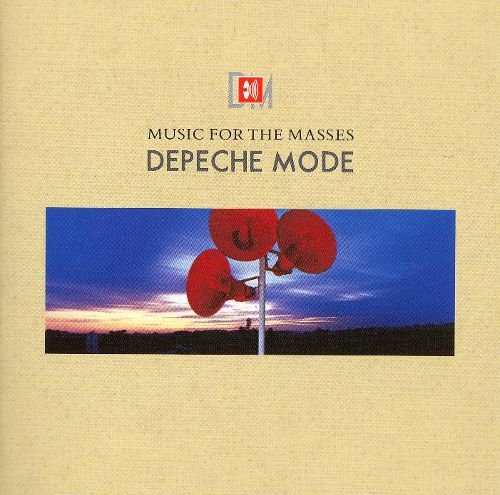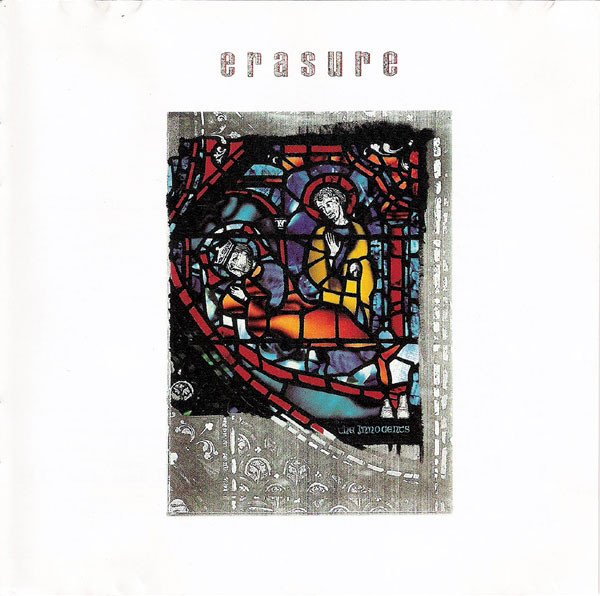合成器在某些人眼中被視為冰冷和虛假的,因為其音響並非透過物理上的弦樂撥奏或皮革敲擊而產生,儘管自1960年代以來它們一直占有重要地位。在70年代,布萊恩·伊諾、克拉夫特維克和康等藝術家展示了無限的可能性。英國及其他地區的樂隊因此受到啟發,創作了將更多旋律型歌曲與流行元素結合的電子音樂。合成流行音樂由此誕生。一些音樂人完全投入合成器和鼓機,而另一些則將其與更傳統的樂器結合在一起。正如朋克和後朋克所展示的那樣,創作並沒有規則,只有想像力。
合成流行音樂的冷漠觀感在80年代透過舞曲節拍和朗朗上口的旋律,與更主流的聽眾建立了聯繫。但這並不是全然的流行輕佻。合成流行團體,例如他們的後朋克同輩,並不迴避社會評論、政治或其他藝術抱負。流行音樂的成功是很棒的,但最好的專輯以某種方式挑戰現狀,並讓聽眾在舞動或獨自在臥室裡沉思時有所思考。這不僅僅是昙花一现—合成流行音樂對當今的音樂有著持久的影響。沒有CHVRCHES、Ladyhawke、Cut Copy或M83就沒有今天的音樂。這裡有10張80年代的合成流行專輯,至今依然引起共鳴。

Orchestral Manoeuvres in the Dark: Organisation
In 1980, Orchestral Manoeuvres in the Dark was a trio, composed of co-founders Paul Humphreys and Andy McCluskey along with Malcolm Holmes (percussion) with one album under their belts. Organisation released later that year is considered darker than its predecessor — McCluskey had reportedly listened to a lot of Joy Division’s Closer earlier that summer (in the aftermath of Ian Curtis’s death) and this along with OMD’s associations with JD and Factory Records influenced the album’s sound. It incorporates more emotion over the futuristic bleeps and bloops of their first album. Hit single “Enola Gay” features an incredible instrumental chorus, which, juxtaposed with its anti-war subject matter, demonstrates OMD’s early goals of artistic weight over pop fluff (that would come later). Another highlight is “Statues,” partially about Curtis, and the sadness is breathtaking in the line “I can’t imagine how this ever came to be.” Organisation features other earworm melodies and moody soundscapes like on “2nd Thought,” the slow dance beat of “Promise” and the beautifully glacial “Stanlow,” which is more ambient in tone. OMD’s first three albums are stone-cold classics but Organisation edges the others out with its atmospheric ambition.

Yazoo: Upstairs at Eric’s
Synth-pop godfather Vince Clarke left Depeche Mode in 1981 (a group he co-founded and for whom he wrote its first singles) and quickly formed Yazoo (Yaz in the U.S. and Canada) with singer Alison Moyet who had previously sung in punk and blues bands. Their debut Upstairs at Eric’s (1982) is the gold standard in early ’80s synth-pop where melding organic and synthesized sound was still finding its footing. Listeners were blown away by the simple melodies, minimalist beats and soulful vocals. The bubblegum earnestness of “Only You” yearns for a love that seems distant and dance hit “Don’t Go” demands a lover stay. Moyet burns the poseurs in “Goodbye 70’s” and her blues roots go dark on “Winter Kills.” Upstairs at Eric’s had staying power throughout the ’80s, with “Don’t Go” and other dance hit “Situation” frequently played on pop and alternative radio. The U.S. release (which features “Situation”) got a reissue from Mobile Fidelity in 2011 and it’s never sounded better.

Depeche Mode: Music for the Masses
Like a batter calling his shot, Depeche Mode named their sixth album Music for the Masses (1987) and the album’s ambition brought DM out of adolescent bedrooms and into stadiums. Opener “Never Let Me Down Again” is a banger with singer David Gahan at his best, meant for high volume and complete with Led Zeppelin drum samples. Is it about drugs? A same-sex lover? Does it matter? More than a few people picked the needle up to start this album over just to take in the sheer grandeur of it. “Strangelove” is an ode to kink, in the vein of “Master and Servant” but instead of going for shock value, as “Strangelove,” is DM all grown up. The long intro to the hard driving “Behind the Wheel” has both Gahan and Martin Gore in harmony singing about surrender to a partner. “Sacred” confesses the complete devotion to love, the noir-ish “To Have and To Hold” is someone hitting bottom and wishing for something good before spiraling into “Nothing” and its seductive dance groove. Music for the Masses is sexy, bombastic synth-pop at its finest.

The Human League: Dare
The Human League may make the uninitiated think of ’80s kitsch but music fans know the band was a pioneer of synth-pop, influencing artists from Vince Clarke to Moby. Founded in 1977, by 1981 the Human League were a new band with two founding members having left to form Heaven 17, leaving singer Philip Oakey and Philip Wright to recruit new personnel (singers Joanne Catherall and Susan Ann Sulley and synth players Ian Burden and Jo Callis) as well as focus on Oakey’s goal of more mainstream success. With the pressure on to deliver, the Human League released third studio album Dare (1981). Dance songs like “The Sound of the Crowd” and “Love Action (I Believe In Love)” sit comfortably with the more avant garde tracks like “Seconds” and “I Am The Law.” But let’s not forget the most popular song on the album, “Don’t You Want Me,” a duet between Oakey and Sulley about an entitled man who is bitter his successful ex wants to be on her own; the song’s unforgettable chorus belies a hint of danger made more apparent by the music video. Genre-defining, Dare holds up as a combination of art pop and emotional resonance.

Berlin: Pleasure Victim
Before the Top Gun soundtrack brought them international visibility, Berlin was a struggling band in the Southern California music scene. Not so much an electronic act as a new wave band interested in merging synths with traditional instruments, Berlin nevertheless created synth-pop awesomeness on second album Pleasure Victim. Initially released in 1982 by a smaller label before getting a re-release the following year on Geffen, the album is the early ’80s musical embodiment of neon-lit L.A. streets. With the help of a bold title and singer Terri Nunn’s fearless guise as object-of-desire, Berlin set the stage for new wave’s rise in SoCal. Novelty hit “Sex (I’m A…)” may have been banned by some radio stations for explicit content but it has had a cult staying power over the years, covered by the likes of Peaches and Lovage. Synths sweep down in the fast-driving “Masquerade.” A careening synth-line, Euro imagery, and Nunn’s escalating anger at a lover turned “The Metro” into a synth-pop dance classic, sure to get party-goers dancing and singing along.

New Order: Low-Life
The push and pull between dance and their post-punk roots on the first two albums and non-album singles left early New Order fans unsure of where they were headed, but third album Low-Life (1985) solidified the band’s direction in dance rock and synth-pop. Guitars and Peter Hook’s signature bass lines remain but the tone is anchored by atmospheric synths that fit the darker emotions of the album. A bright harmonica opens “Love Vigilantes” about a homesick soldier but it turns to horror as he realizes he’s dead. Anger is laid bare on “Sunrise” which starts with an ominous synth line before Hooky breaks in on bass, Bernard Sumner barely sings on key, and a trashing guitar overtakes it in a duel of strings. The mournful “Elegia,” written in tribute to Ian Curtis, is an epic instrumental which slowly builds layers of synth, bass and eventually guitar. And you can dance while crying to “The Perfect Kiss” about a young person who wants to believe in love and ignores whatever crisis their friend is experiencing (“pretending not to see his gun, I said ‘let’s go out and have some fun’”) but later their friend dies. There’s so much here on Low-Life, each listen reveals something new.

Pet Shop Boys: Please
Pet Shop Boys’ debut album Please (1986) takes listeners into a world filled with hedonism, disaffected youth, and anti-materialistic anthems (the ironic “Opportunities (Let’s Make Lots of Money)”), but did it in glorious synth-pop rather than angry punk. Neil Tennant and Chris Lowe formed PSB as a result of a shared love of synthesizers and dance music and staked a claim as being one of the best synth-pop duos of the ’80s. “West End Girls” became a huge hit and is one of their most memorable songs, with Tennant doing an aloof yet mesmerizing rap about the working class trying to mix it up with the upper-crust on a night out. “Suburbia” comments on suburban violence while referencing the 1984 iconic punk film Suburbia. My personal favorite is “Love Comes Quickly” about not being able to stop yourself from falling in love. Late-night-listening really doesn’t get any better. Using samples and techno beats, dance hits float over a dark undercurrent — the search for connection and finding pleasure in meaningless pursuits can’t erase the bleak reality for many or the risk that comes from being yourself.

Eurythmics: Sweet Dreams (Are Made of This)
Eurythmics may have officially been a duo but Annie Lennox and Dave Stewart were not above utilizing a who’s who of musicians in order to achieve the sound they wanted. They used their own studio, and later one that would eventually be owned by Stewart, which allowed them the freedom to experiment with their desired blend of avant garde and pop. Their efforts paid off on second album Sweet Dreams (Are Made of This) (1983). Stewart’s programmed beats and Lennox’s R&B vocals evoke Yazoo with a more artistic bent. The album opener (“Love Is A Stranger”) starts lightly with the sounds of a synth autoharp but it takes a darker turn as Lennox warns how love can turn obsessive and cruel. The title track, an ’80s staple, explores the search for fulfillment, which may or may not be a physical one. Another album highlight is the wild cover of Sam & Dave’s “Wrap It Up” on which Lennox duets with Scritti Politti frontman Green Gartside. It reminds the listener that Sweet Dreams is a fun album full of catchy hooks, experimental interludes and one hell of a voice.

Soft Cell: Non-Stop Erotic Cabaret
Marc Almond and Dave Ball met as art students in 1977 and formed Soft Cell, a group perhaps best known for their worldwide hit, the excellent cover of Gloria Jones’ “Tainted Love,” but Soft Cell was anything but mainstream. Debut album Non-Stop Erotic Cabaret (1981) is a sharp contrast to the romantic synth albums mainstream listeners favored, featuring a minimalist synth style that goes straight to the experimental underground. Singer Marc Almond took his love of performance art and theatricality into songs about suburban boredom (“Frustration”), porn theaters (“Seedy Films”), and the impoverished lifestyle of the club-goer (“Bedsitter”). In the context of the album, “Tainted Love” is more sinister in its indictment of a selfish partner. But it doesn’t get sleazier than “Sex Dwarf,” a lurid ride conjuring dark clubs and sex shops. Complete with a NSFW video, the non-single became an alternative radio favorite. The album closes with ballad and U.K. hit single “Say Hello, Wave Goodbye” about an ended love affair but Almond sounds more relieved than forlorn. Non-Stop Erotic Cabaret is a statement on alienation, hypocrisy and in-your-face debauchery. It’s awesome.

Erasure: The Innocents
The Innocents (1988) is a pop masterpiece and features one of the best pop songs of all time. Vince Clarke (yes, him again) teamed with singer Andy Bell in 1985 and formed what has become one of synth-pop’s enduring icons. Soulful vocals paired with up-tempo synth beats made for a killer combination and Erasure hit its stride on third album The Innocents, finally breaking through in the U.S. on the strength of singles “Ship of Fools,” “Chains of Love” and the classic “A Little Respect.” Even the non-singles have some great choruses that make it easy to sing along to and singing is what this album is all about. Bell knocks you on your ass with ballads and dance gems, including should’ve-been-a-single “Phantom Bride,” the gospel-influenced “Yahoo!” and the social commentary of “Hallowed Ground.” But “A Little Respect” alone makes this album perfect. The music builds around Bell’s pleas for respect from a lover, declaring his love but making it clear that he expects more than what he’s getting. Erasure gave synth-pop a bona fide anthem and pop fans will be forever grateful.








